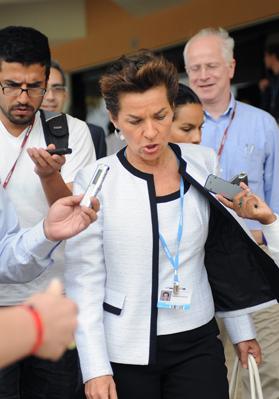U.S. and China Inch Closer Together
Posted on 03. Dec, 2010 by astark in U.S.A.
Finally, some resoundingly positive news from the Cancun UN climate talks: the United States and China may be close to a deal on one of the key issues that is holding back a series of deals that are expected to emerge from the COP-16 negotiations.
Relations between the world’s two largest emitters have noticeably improved since the UNFCCC last met at an intersessional meeting in Tianjin, China in November. There, the media seized on contentious statements from both sides that highlighted the other country’s intransigence at the negotiations.
If Tianjin was a marked by a dignified US-China catfight, then Cancun is a tea party, where both sides seem to be on their best behavior. In a press briefing earlier this week, head U.S. negotiator Jonathan Pershing said that “our relationship with China is extremely important…. I think that a success here will only emerge if we can both come to agreement. We spent a lot of energy in the past month working on those issues where we disagree and trying to resolve them. My sense is we have made progress,” going on to note that the two delegations had met several times in the 6 intervening weeks between Tianjin and Cancun and that relations had been quite cordial. Similarly, the head of the Chinese delegation Su Wei dodged several opportunities to criticize the US in a recent press interview, saying rather benignly that “we recognize that the U.S. is doing quite a lot after President Obama took office.”
When the trackers met with the UNFCCC Executive Secretary Christiana Figueres yesterday evening, she referred to the “alphabet soup” of acronyms at the UNFCCC that sometimes obscure what is really going on. The situation here is no different, since it refers to something known as MRV, the kind of acronym that makes you want to stop reading as soon as you spot it. In Tianjin, I wrote about the increasing tensions between the US and China over MRV, which had existed since the Copenhagen talks last December but seemed to flare up more than usual in Tianjin.
MRV is short for measurement, reporting and verification, and refers to whether developing countries will be subject to international verification of their domestic mitigation actions. The United States argues that MRV is the best way to “create confidence in the process and for one country in the actions of the other country,” in Pershing’s words. U.S. delegates say that the United States already undergoes rigorous reporting of its domestic mitigation actions in order to build the international community’s confidence, and other countries, especially developing countries that receive financial assistance from the developed world on their mitigation actions, should do the same. China says that they are not necessarily opposed to MRV on domestic actions undertaken with foreign assistance, but that generally there is no requirement under the UNFCCC or the Bali Action Plan to do so.
After Tianjin it seemed as though things were at an impasse, and there would be no space for compromise. Since the United States has said that no deal will be reached in Cancun unless the party countries are able to make progress on all of the issues, this stalemate has the potential to hold back the entire process. Yet this week, a small ray of hope has slowly emerged. It began with Indian Minister Ramesh’s compromise proposal, which my esteemed Indian colleague Leela Raina details here (note that ICA, international consultation and analysis, is part of MRV). The proposal offered something to both sides, since it doesn’t distinguish between developed and developing countries, but would subject countries that emit more than 2% of global emissions to more frequent scrutiny than others (aforementioned esteemed colleague says “don’t ask me why 2% in particular”).
This week, China and the United States both began to dance around the edge of the proposal. Yesterday, head of the UNFCCC Christiana Figueres indicated that the Chinese delegation was in broad agreement with the proposal. The AP quoted Su Wei, the head Chinese negotiator, saying that the US-China differences are “are not that huge. In general, both countries would like to promote the process,” and “we have no problem with MRV.” The United States hasn’t totally assented to the proposal, but in typically understated fashion, Pershing mentioned that “we are just now getting into the formal discussions, or I should say the informal discussions on these detailed questions… coming in, it was quite clear that we were converging. But we’ve not yet reached agreement.”
Obviously, this is not a seismic shift in either country’s position. Yet nothing happens suddenly at the UNFCCC negotiations: every step is the result of hours and hours of careful negotiation between and amongst countries. Sometime this afternoon, the United States and China held their first (and highly secretive) bi-lateral meeting in Cancun, and as the week progresses we expect to hear more on this emerging agreement, so watch this space!
With any luck, this news could be the first step towards a robust and exciting outcome here in Cancun.
-
http://live.tcktcktck.org/2010/12/and-now-we-wait/ And Now We Wait | live.tcktcktck.org
-
http://feedproxy.google.com/~r/adoptanegotiator/~3/dA4dhQQH8x4/ And Now We Wait | adoptanegotiator.org
-
http://feedproxy.google.com/~r/adoptanegotiator/~3/snuDUd28tOk/ Cancun Update: LCA Text Released | adoptanegotiator.org
-
http://live.tcktcktck.org/2010/12/steven-chu-u-s-energy-secretary-speaks/ Steven Chu, U.S. Energy Secretary, Speaks | live.tcktcktck.org
-
http://feedproxy.google.com/~r/adoptanegotiator/~3/RVGxVP2PysE/ Steven Chu, U.S. Energy Secretary, Speaks | adoptanegotiator.org
Negotiator Tracker - Alex Stark
Alex Stark joins the project from Washington DC, where she's focused on legislation addressing drivers of violent conflict around the world, including the effects of climate change. Tracking the US negotiators and getting the word out about action inside the UNFCCC combine her passions for activism, sustainable development, conflict prevention and US foreign policy. read more»
Read more of Alex's posts here.
Follow Alex on twitter @AlexMStark







